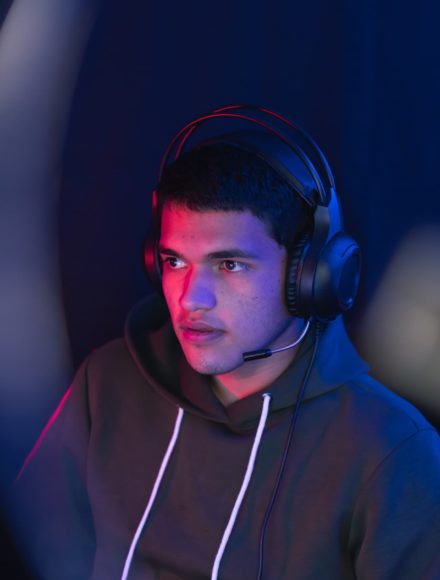HBO’s The Outsider lays out the future of Stephen King on screen

The more of Stephen King’s 93 novels you read, the more quickly you can spot his favorite character types. Yes, there’s usually a ghoul of some kind lurking in the shadows, but King’s monsters don’t pursue just any humans. He often focuses his stories on a beleaguered middle-aged man who’s sometimes a writer, and is always introspective. This man, sometimes accused of being King’s stand-in for himself, always rolls his eyes at his hero’s journey.
He has other favorite types, too. King is a fan of writing about children or otherwise vulnerable people whose unnatural abilities set them apart from mainstream society, while making them attractive to malign forces. (See: The Institute, The Shining, Firestarter, Dreamcatcher, Carrie, The Green Mile, Doctor Sleep, The Dead Zone, It, etc.) And his connected-universe mythology, introduced in his Dark Tower series and explored at length elsewhere, explains the motives of these archetypal figures, and binds them inextricably to forces most of them can’t comprehend.
In King’s grand united universe, the battle isn’t so much about good vs. evil. It’s more like chaos vs reason. This dynamic is never more beautifully laid out than in HBO’s now-completed adaptation of King’s 2018 novel The Outsider. King’s usual gang are all present in the story: when a monster visits a small town, it’s chased by both begrudging hero-cop Ralph Anderson (Ben Mendelsohn) and the socially awkward but magically sensitive Holly Gibney (Cynthia Erivo). The unique relationship these two characters develop is what sets The Outsider apart from business as usual for King’s writing. Erivo and Mendelsohn play out their bond so realistically that they feel like they’re breaking new ground for a King-inspired story. While his books often have that level of painstaking connection to the mundane and grounded, his film and TV adaptations rarely do. But The Outsider shows how a new age of Stephen King adaptations could work, by mixing believable drama with delicate hints at his complex mythos.
:no_upscale()/cdn.vox-cdn.com/uploads/chorus_asset/file/19826212/cynthia_erivo_max_beesley.jpg)
Photo: Bob Mahoney/HBO
Holly is a rare figure, in that she’s borrowed from an otherwise unrelated King series — she’s a character holdover from his novel Mr. Mercedes and its sequels. Rarer still, she seems to understand more about her unique sensitivities than most of King’s folks who “shine.” Holly doesn’t call her abilities “the shine” the way troubled protagonist Danny Torrance does in The Shining and Doctor Sleep, but her abilities are much like his, because they come from the same part of King’s mythos. The world unveils itself to her more naturally than it does to others, and yet she has trouble communicating with typical people. As The Outsider’s finale reveals, Holly actually shares a few important traits with the ghoul she’s chasing.
On the HBO series, Erivo plays Holly as if she’s on the spectrum, delivering harrowing information with no emotional affect. And, like Danny and Dick Hallorann (The Shining), John Coffey (The Green Mile), Duddits (Dreamcatcher), and Bev Marsh (It) before her, Holly can get impatient with pragmatic characters like Ralph. Men like Ralph (Paul Edgecomb in The Green Mile, Louis in Pet Semetery, Bill Hodges in Mr. Mercedes) have all the same selflessness and moral imperative as people with the shine, but they lack imagination.
And they also lack ka, King’s mythic central force that animates all living things. In his novel Insomnia, King explains that ka has two natures: Random (essentially evil) and Purpose (essentially good). You can think of it like the Force in Star Wars, being multi-sided rather than inherently benevolent or malign.
But ka is only present in The Outsider if you subscribe to the rules of Stephen King’s entire multiverse. Those rules are an enjoyable deeper level to King’s stories for longtime fans, but their absence doesn’t detract from any given King story if you don’t; they’re ideal Easter eggs in that way. Outsider fans flipped out when Holly name-checked ka in episode 3. Given how showrunner Richard Price has expressed his disinterest in a connected King universe, the quick mention was probably just a fluke. Holly says “Egyptians called [the Outsider] ka,” which is only sort of true.
Still, The Outsider made some unprecedented moves in playing with King’s elements. The actual Outsider, a shapeshifter attracted to human pain, is probably attuned to High Random, the manipulation of ka for cruelty and violence. It isn’t a metaphysical dark god, but it isn’t a human lackey, either. When a High Random force occupies an object in a King story, it can manifest as the death-reversing cemetery in Pet Semetary, the murderous car in Christine, or the rabid dog in Cujo. People powered or afflicted by ka with a Random alignment — say Carrie’s abusive mother in Carrie, most of the Losers’ neglectful or oppressive parents in It, the belligerent prison guard Percy in The Green Mile, or compromised cop Jack Hoskins in The Outsider, may be powerless to avoid taking violent actions, even if they understand they’re wrong. The same goes for characters blessed with ka sensitivity who naturally align with High Order; arguably, Doctor Sleep is all about Danny Torrance realizing he’s powerless against his urge to protect the weak.
:no_upscale()/cdn.vox-cdn.com/uploads/chorus_asset/file/19355925/rev_1_DS_04253r_High_Res_JPEG.jpeg)
Image: Warner Bros. Pictures
That kind of altruism and protective instinct is an important virtue in Stephen King’s novels. He also tends to reward open-minded characters like Holly, who watch unnatural situations unfold and respond without cynicism or disbelief. No sense in pussyfooting around, King seems to say. If a graveyard seems cursed, it probably is. If a clown appears in a sewer grate, you’d better not follow him down there. And if you find yourself stuck with a rag-tag group of people trying their best to help people who are suffering, you’ve probably got yourself a ka-tet.
As defined in the Dark Tower novels, a ka-tet is a mystically drawn-together team of minor heroes. They don’t all have to shine, necessarily, but one of them usually shines brighter than the others. Most importantly, they’re plucked out of obscurity by the forces of High Order, and whatever creature is chasing them all will try its hardest to tear them apart. Think the Losers in The Shining, the survivors in Cell, the kids who form ranks around Duddits in Dreamcatcher, and yes, the group of cops and business owners who come together in The Outsider. Teamwork, according to his idea of the ka-tet, is another important Kingsian virtue.
We can assume a few more things about The Outsider, given that the world of the show appears to be exactly like our own, with two distinct differences. First, there’s a malevolent shapeshifter walking around, one that likes to eat children and then feast on the ripples of grief in that child’s community. Second, there’s been no mention of Stephen King in the universe of the show, which indicates that The Outsider takes place in All-World. Our familiar real world is Keystone Earth in Stephen King’s multiverse — the dimension where King himself lives. A few of the fictional beings in his multiverse are aware of him and his horror novels, as he’s motivated by Gan (the multiverse’s God) to write, and the Dark Tower’s hero Roland learns about his own home (All-World) by reading King drafts.
The Outsider series doesn’t explicitly reference King’s multiverse, which feels like a breath of fresh air. We’re at a bit of a flashpoint with King adaptations, hinged on the dark fantasy It films doing well commercially, and the equally complex Doctor Sleep exceeding critics’ expectations. There’s an industry-wide pressure to stuff every franchise to the gills with interconnected bits of fan service. But The Outsider is different. It falls into place among other grounded King stories that only point vaguely at ka, digestible crowd-pleasers like The Green Mile, The Shawshank Redemption, and Stand By Me. If the comparatively grounded, serious adventures of Ralph, Holly, and their not-named-as-such ka-tet are the sign of what’s in vogue, we’re in for a nuanced age of King adaptations.
The 10-episode series The Outsider is now available in its entirety on HBO Go and HBO Now.
—
Polygon





